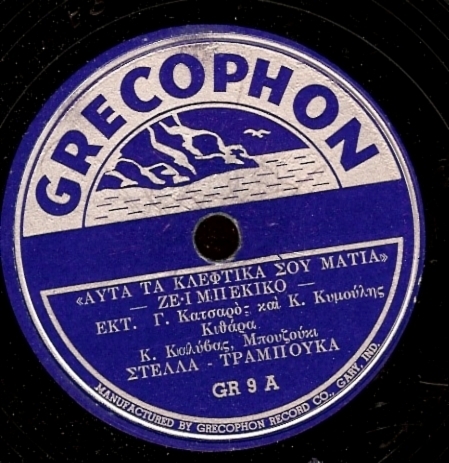Στο βίντεο παρουσιάζεται και αυτή η ετικέτα.
Συνολικά βρήκαμε μέχρι στιγμής 11 συμμετοχές στην δισκογραφία του Κώστα Καλύβα.

Στο βίντεο παρουσιάζεται και αυτή η ετικέτα.
Συνολικά βρήκαμε μέχρι στιγμής 11 συμμετοχές στην δισκογραφία του Κώστα Καλύβα.

Αυτή είναι η σχέση Περικλή, εκτός από ένα κοινό τραγούδι στην ATHENA, που παρουσιάστηκε παραπάνω.
Πάλι απρόσεχτος… Αυτό είχε ήδη αναφερθεί στο παλιό #10.
Κι άλλο ένα αναφέρεται στο παλιό 9η Έκθεση Οργανοποιίας - Κανονίσματα, αλλά χωρίς τίτλο, μόνο με ένα λινκ που πλέον είναι νεκρό.
Δεν είναι νεκρό το λινκ, το έφτιαξα να λειτουργεί τώρα ![]()
Για σας, ειμαι ο ιδιος που εκανα τη θεση, μα ξεν μιλαω καλο ελληνικα. Θα γραφω στην αγγλικα. A few years ago I was lucky to meet the nephew of Kostas Kalivas, George Manikas who was born in 1929. He died a couple years ago nearly 90 years old! He had learned bouzouki in the 30s when he was 6 or so, playing on the vraxas bouzouki of his dead father. Anyways, he told me Kalivas came to the United States around 1918 from Mamousia, near Patras. He started out on laouto and guitar and then later added bouzouki. He was the first bouzoukzis to tour out to the west from what his Manikas said [excepting Jack Halikias tour of California in the 30s]. He told me that Kalivas died on stage in New York in the 70s and from what others who knew him have told me Kalivas was very fond of Russian and Romanian music (there is a record of the song korobushka at Jack Halikias house, but I think it is Jack with Thanasis Athanasiou) and Kalivas is the primary exponent of Dimotiko bouzouki both from his home recordings with Halikias and the commercial recordings. I have also learned the identity of Pulos, Pulos was the nephew of Kalivas and cousin of Manikas. Manikas told me he was one of the first speed players and a virtuoso at the same level as Jack (well he said he was even more musically adept than Jack!), I remember there was a record of Poulos at Jacks playing a solo Kleftiko and Jack Jr. said “who can this be he plays faster and cleaner than Hiotis”. Unfortunately, on the Athenas it seems Pulos is playing laouto instead, he started as a violinist and was classically trained but also played bouzouki, laouto and guitar. According to Manikas Poulos was mainly playing an old Zozef a sailor stole from Papaioannou off stage in the prewar period and brought to America. Manikas knew Papaioannou too and he told me “I regret not asking Papaioannou about that bouzouki”. I’m trying to get in contact with Pulos son now and if I find anything I’ll post updates. Fotis, do you have the music for Louloudi ths Monemvasias and Ta Matia Sou Ta Arapika?
Another thing, Jack was not related by blood to Kalivas he just called him cousin.
Okay I just saw there is no sound from any of those songs you posted Fotis, Xaravgi can be found on sealabs or google
Περικλή, σίγουρα για το γνωστό μωραϊτικο καλαματιανό πρόκειται, έ; …και κάστρο της Αθήνας (Ακρόπολη) και Παλαμήδι τ’ Αναπλιού. Η Δόμνα Σαμίου, πάντως, λέει “Λαλούδι της Μονομπασιάς”, προφανώς δασκαλεμένη από την Μιράντα…
Is this Pulos (G. ? ) a derivative of Achilleas Poulos?
Όχι σίγουρα. Υποθέτω απλώς.
Αν τυχόν υπάρχει κι άλλο τραγούδι, που να λέει όντως λουλούδι, και που να μην το ξέρουμε, τότε μπορεί να είναι αυτό. Αλλά το άλλο είναι πασίγνωστο, οπότε το πιθανότερο είναι να είναι εκείνο (δηλαδή ναι, το καλαματιανό που συνεχίζει με Κάστρο της Αθήνας κλπ.).
Αυτό είναι, σίγουρα κατά τη γνώμη μου, δεν έχω ακούσει άλλο παρεμφερές. Η Σαμίου μας το είχε μάθει ως λαλούδι, που το εξηγούσε κάστρο, κοντά έπεσε. Κάποιος στο ιντερνέτ, υποθέτω Ρουμελιώτης, προτίμησε να πει «κάστρο της Λαμίας» αντί Αθήνας, αλλά όλα τα άλλα, τα άφησε όπως τα λένε οι Μωραΐτες: «*Να δώ τις Αναπλιώτισσες *κλπ.».
Well I’m sure Jack Halikias knew and played with Axilleas but from all that I know Giorgos Poulos has no relation at all but they probably knew each other. Giorgos was born in America in 1913 and died in 2003, Manikias his cousin told me how they used to play things like To Minore Tou Teke at house parties together. He also said he played in a similar vein to Halikias but that he even surpassed him in some ways. I’m hoping to hear the songs he recorded at Halikias house again so I can remember his style
Also worth mentioning although listed on the Athena as G. Pulos, he went legally by George Polos and his family also goes by Polos
One other thing worth mention, Manikas told me that one distinguishing feature of Pulos was that he tried to avoid using too much repetition in his music. He really emphasized that fact to me and that was one thing that differentiated him from other players
Περικλή, το λινκ δεν δουλεύει πια. Μήπως θυμάσαι, χοντρικά, τί περίπου έλεγε αυτή η ανάλυση, εκτός από το ότι σημαίνει βράχος κλπ;
Όχι, καθόλου. Όμως το λινκ (εμφανίζεται κάτω αριστερά στην οθόνη αν αγγίξεις την μπλε λέξη «ανάλυση» με τον κέρσορα χωρίς κλικ) περιλαμβάνει τις λέξεις «το λαλούδι της Μονοβασιάς», στα ελληνικά, οπότε το γκούγκλαρα, μαζί με την ένδειξη pdf, και το ξαναβρήκα. Τώρα θα προσπαθήσω να ανεβάσω το ίδιο το αρχείο (όχι μόνο ως λινκ) για να μη μας ξαναφύγει:
Κίγκα Ελ., Το λαλούδι της Μονοβασιάς.pdf (1,2 MB)
Σε κάθε περιπτωση: Ελένη Κίγκα, «Το λαλούδι της Μονοβασιάς», σημερινός σύνδεσμος https://olympias.lib.uoi.gr/jspui/bitstream/123456789/26443/1/Το%20λαλούδι%20της%20Μονοβασιάς.pdf
Edit: Μάλλον τα κατάφερα. Κατεβαίνει από τον πρώτο σύνδεσμο που έβαλα.
Και ξαναedit:
Τι να θυμάμαι χονδρικά, αφού λέμε απερίγραπτα εμβριθής!
(Τώρα που τα ξανακοιτάω, το παλιό λινκ που δε δουλεύει είναι ακριβώς το ίδιο με το καινούργιο που δουλεύει, εκτός ότι το δεύτερο έχει στην αρχή https:// Δε θα 'πρεπε να δουλεύει και χωρίς αυτό το κομματάκι;)
Δεν ξέρω, αλλά επί του θέματος, είδα το κείμενο και ευχαριστώ πολύ!